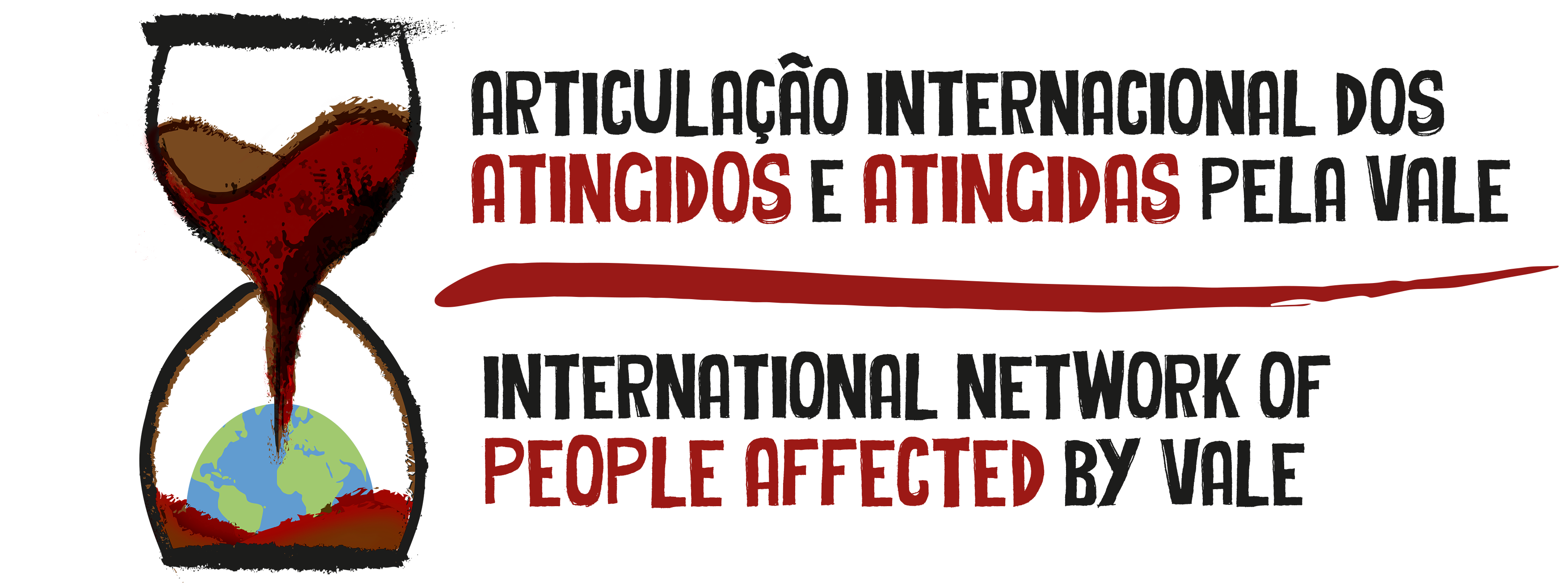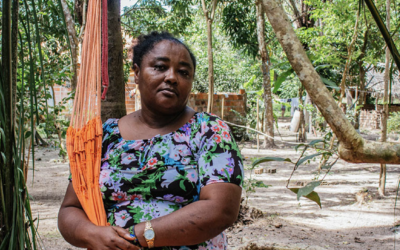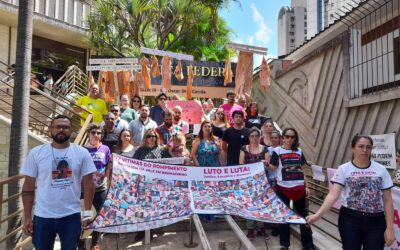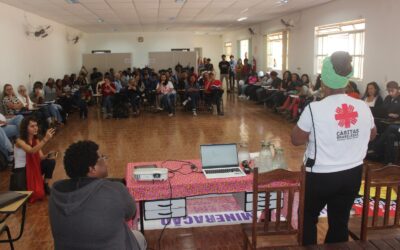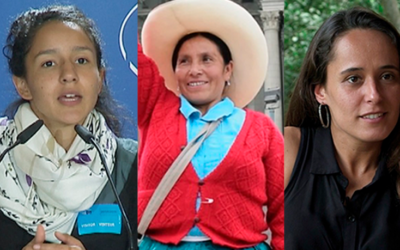On April 25 eight shareholders with critical perspective who represent organizations that belong to the International Articulation of People Affected by Vale, made their presence felt to company shareholders gathered for Vale’s Annual General Meeting. The main objective for participating in such a cold space where positions are predetermined was to take a stand. It was a way to cause embarrassment, to force the company to accept responsibility for the damages they have caused and to demand respect. Since the Vale Directors seem incapable of even hearing critical perspectives, we have concluded that criticisms really bother them, especially in a space that they dominate so completely.
A first confrontation at the meeting was the attempt of the Directors to limit the right to speak, alleging that issues related to socio-environmental problems of the company were irrelevant to the agenda of the Vale AGM. They went on to announce that interventions during plenary, even those related to reading votes submitted in writing, were limited to three minutes. In response, members of the Articulation indicated firmly their disagreement, questioning what the Directors came to the assembly to do if not to listen to the shareholders’ concerns, the annual assembly of shareholders being designed exactly for this purpose.
Moreover, they argued that shareholder demands to discuss social and environmental responsibility issues should be treated as normal, since social and environmental issues relate directly to the economic and financial performance issues that were on the meeting agenda. Still, a bureaucratic and authoritarian environment prevailed, with attempts to curtail the interventions of the shareholders. When the votes of critical shareholders were read, the microphones were cut off after three minutes; the only option left was to take courage and continue with the arguments to justify the vote in a loud voice!
On the format and institutional norms of the Assembly there was a request for the sixth consecutive year for the preparation of detailed minutes, with the written votes attached in their entirety, rather than the summary minutes, which is the current practice. The company’s lack of transparency, the abysmal flow of information between the company and its shareholders and the complete lack of interest in best practices in company governance are clear.
The criticisms raised were based largely on the omissions in the report from Vale management. No mention was made of the significant financial, legal and environmental risks in projects that operate with irregularities in the environmental licensing requirements, There is strong evidence of human rights violations reported in the several lawsuits that have been filed. Alongside the company’s projection of what shareholder were concerned about, namely company image and reputation, the company’s credibility in the market and the profitability of the business, there were critical reports of emblematic cases, such as the breach of the Samarco tailings dam (Vale and BHP Billiton). This highlighted the absurdity of the company trying to restart its operations in Mariana before completing and disseminating results of the investigation into what caused the breach and before formalizing a plan to repair the environmental damage. Moreover. Vale is also embarking on three more major dams (using the same outdated technology of the Fundão dam that collapsed in Mariana) in an important area for human water supply in the metropolitan region of Belo Horizonte. Other cases highlighted by the critical shareholders were the Hydroelectric Complex of Belo Monte, with its very serious environmental consequences and corruption schemes, the illegality of the operation of Companhia Siderúrgica do Atlântico (CSA), violations in the Logistical Corridor of Nacala (Mozambique) and the intensification of conflicts in the states of Maranhão and Pará, due to the development of the S11D project and the doubling of the Carajas railroad.
The critics also pointed to the lack of investment in research and development and application of new technologies (more expensive, but with less negative impact). They highlighted the need for a complete overhaul of Vale’s corporate social responsibility policy. Other company strategies were subjected to criticism, among them the establishment of joint ventures and combining increased production with cost reductions, which greatly enhances the risk of accidents and technological disasters, as occurred with the Fundão tailings dam.
The only point raised by the shareholders that drew any response from the Vale Directors was the breach of the Samarco tailings dam (Vale and BHP Billiton) in Mariana, which caused social and environmental damages along the Doce River Basin and coastal area of Espirito Santo and Bahia states. The company said it supported Samarco in various actions such as the purchase of drinking water. We consider this insignificant given the magnitude of the destruction caused to the Doce River Basin. With regard to the causes of the breach, the Vale Directors said they were conducting their own investigation to be completed in June/July. When the critical shareholders asked where the research results would be made available, the response they received was (gasp!) “We do not know if we will publish”. This shows clearly that the company does not consider that it owes any response to society for the environmental disaster.
The salary proposals for Administrators and Audit Committee members were also targeted for dissenting votes from the critical shareholders. They considered these proposals absolutely inconsistent with the company’s financial situation: “It is shameful that a Vale director is receiving 848,000 reais per month (clear) while lives, communities and entire cities have been and continue to be destroyed and annihilated by Vale activities”. The objections from the critical shareholders became even more weighty when, at the same time, mine workers in Vale’s operation in Ouro Preto/MG, were on an involuntary three month lay-off. During this time, they were receiving only half of their salary which is currently about 1,400.00 reais/month.
A letter of protest to the mining companies was tabled, signed by 34 organizations from the12 countries that participated in the VI Meeting of OCMAL (Observatory of Mining Conflicts in Latin America[1]. The letter demands that no new dam be licensed in Brazil until it has the results of the causes of the tailing dam breach and carefully assesses new premises and technical standards. Moreover, society must be consulted before any decision is taken about new tailings dams.
Finally, a motion was made for the collective resignation of the people who held the positions of Executive Officers, the Board of Directors and the Council of Auditors at the time of the breach of the Fundão dam. Those presiding over the AGM refused to entertain the motion, claiming this issue was not on the agenda. It became necessary to take this up after the Assembly with the person responsible for the relationship with the company’s investors in order to find a way to deal with the motion.
Parallel to the AGM, the Articulation of People Affected by Vale organized activities in the center of Rio de Janeiro. There was a “teach-in” addressing the impacts of mining and human rights violations of Vale in Brazil and worldwide. The Largo da Carioca square was the scene of cultural interventions, a theatrical performance and photo exhibition on the disaster of Mariana/Doce River Basin. The group walked to the former headquarters of the company in Graça Aranha Street, in the center of the city, where people drew graffiti and invented slogans to write on the black fences that protect the building.
Through these actions, the International Articulation of People Affected by Vale tried once again to make visible the reality of Vale’s operational practices. They are practices of systematic disrespect for the human rights of communities, workers, Indigenous peoples, small farmers and former slave communities, both in Brazil and throughout the world.
[1] http://conflitosambientaismg.lcc.ufmg.br/noticias/mocao-de-repudio-a-novas-barragens-de-rejeitos-em-mg-e-assinada-por-34-organizacoes/
